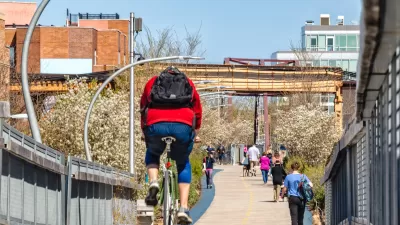"The Idaho Stop,'"which describes bike riders treating stop signs as yield signs, got more support from a recent study by DePaul University.

The Chicago Tribune's Mary Wisniewski and Streetsblog Chicago's John Greenfield analyze a new study out of Depaul University that supports the Idaho Stop. According to Greenfield, a "[n]ew DePaul study that calls for relaxing laws requiring bike riders to come to a complete stop at stop signs and always wait for a green before proceeding through a stoplight."
The research suggests bikers could use the "Idaho Stop," meaning, "…cyclists to treat stop signs like yield signs by decelerating and checking to make sure there’s no cross traffic before proceeding through the intersection, rather than putting a foot down," Greenfield writes. The idea is supported, not just for convenience, but also for safety reasons. "The study also noted that it can actually be safer for cyclists to proceed through intersections in advance of the green, because it eliminates the possibility of being struck by turning motorists after the light changes," Greenfield explained.
The new study adds a wrinkle to the ongoing debate over the Idaho Stop, which is a point of continuous controversy between bicycle advocates and motorists.
FULL STORY: "Idaho Stop" in the Name of Love: DePaul Study Endorses Rational Cycling

Planetizen Federal Action Tracker
A weekly monitor of how Trump’s orders and actions are impacting planners and planning in America.

Chicago’s Ghost Rails
Just beneath the surface of the modern city lie the remnants of its expansive early 20th-century streetcar system.

San Antonio and Austin are Fusing Into one Massive Megaregion
The region spanning the two central Texas cities is growing fast, posing challenges for local infrastructure and water supplies.

Since Zion's Shuttles Went Electric “The Smog is Gone”
Visitors to Zion National Park can enjoy the canyon via the nation’s first fully electric park shuttle system.

Trump Distributing DOT Safety Funds at 1/10 Rate of Biden
Funds for Safe Streets and other transportation safety and equity programs are being held up by administrative reviews and conflicts with the Trump administration’s priorities.

German Cities Subsidize Taxis for Women Amid Wave of Violence
Free or low-cost taxi rides can help women navigate cities more safely, but critics say the programs don't address the root causes of violence against women.
Urban Design for Planners 1: Software Tools
This six-course series explores essential urban design concepts using open source software and equips planners with the tools they need to participate fully in the urban design process.
Planning for Universal Design
Learn the tools for implementing Universal Design in planning regulations.
planning NEXT
Appalachian Highlands Housing Partners
Mpact (founded as Rail~Volution)
City of Camden Redevelopment Agency
City of Astoria
City of Portland
City of Laramie





























